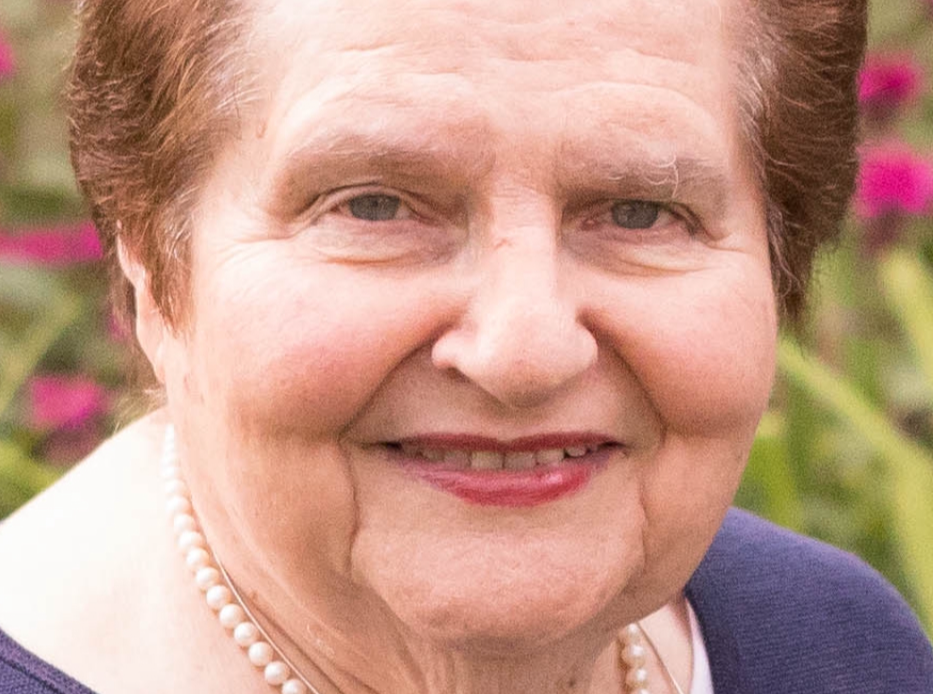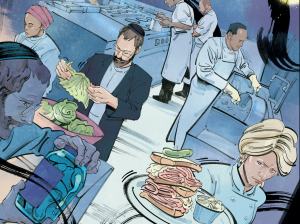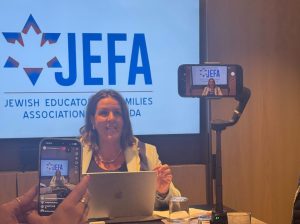Rachel Falconer was a Holocaust survivor who hid in a cupboard as a child while Nazis thrust their bayonets through the clothing trying to find her. She went on to fill her life in Canada with academic achievements, in addition to raising seven children while struggling to come to terms with her past.
She died in Toronto on May 20. She was 91.
Falconer was born on Oct. 4, 1933, in Ludmir, Poland.
Her father Julian Galperson was a commodities trader, and her mother Tania managed a busy, Jewish household with the family attending synagogue on Shabbat and the holidays. Her maternal grandmother was fiercely religious and studied the Talmud while her paternal grandmother was an avid reader and encouraged Rachel.
Before the Second World War, Ludmir (now Volodymyr-Volynskyi, Ukraine) was a centre of political activity with Jews comprising close to 50 percent of the population. In 1939 when Germany invaded Poland, Soviet troops moved into eastern Poland and reclaimed the city, which had been part of Russia prior to the First World War. Falconer’s family home was taken over by the Russian army and they were allowed to live in one room while they were awaiting deportation to Siberia. Instead, they ended up in a small village near Lvov, Poland (now Lviv, Ukraine.)
In 1941, as Germany pushed further into Poland and Lvov came under Nazi rule, approximately 110,000 Jews were forced into the Lvov ghetto, including Rachel, her parents, her sister Esther and her aunt Mania.
In the ghetto, Rachel’s mother Tania met a gentile woman who didn’t have children. Tania (and her father’s diamonds) persuaded the woman and her husband to take Rachel. Her name was changed by her new parents Wanda and Jozef to Lusia, and she was raised as a Catholic. A month after Rachel was ‘adopted’, her new mother, Wanda, brought her to the ghetto wall to meet her father, who needed Rachel’s firsthand assurance that she was eating and sleeping and being treated properly. That was the last time she saw him.
Several months later, one of Wanda’s friends entered into a similar arrangement to look after Rachel’s mother, sister and aunt.
Rachel’s new Polish family did not have papers for her so when intense bombing started in Lvov she was left alone in a pantry on the top floor of her building instead of being able to seek shelter with others in a cellar. Later Wanda moved her to a large, vacant ground-floor apartment and left her alone with a cat for three months, bringing her food every few days. She was nine years old.
After most of the Germans left Lvov as the Soviets were advancing into Poland, Wanda took Rachel back to her home but soon after, Germans came to the apartment. Rachel hid in an armoire behind a wall of coats and clothes as soldiers went room to room, finally reaching her hiding place in the bedroom and shoving their bayonets into the clothing. She hid in the closet for several days but miraculously survived unharmed. She remained in hiding until Lvov was liberated by the Russians. When the city was liberated in July 1944, only 20 hidden Jews had survived in Ludmir.
“We have no clue what she went through,” Rabbi Mendel Kaplan of Toronto’s Chabad Flamingo, who spoke often with her, told The CJN. “We cannot imagine the emotional toll that this suffering inflicted upon her. Rachel sat in a closet for three days straight, afraid to walk out. We can have no idea how the mental stress and anguish she experienced lasted a lifetime.”
After the war she was reunited with her mother although it took her more than a year to get Rachel’s Polish ‘parents’ to give her up. With Poland now occupied by Russia, Rachel’s mother sent her to stay with cousins in Kyiv. Her stay was cut short when her sister, Esther, who had survived the war, contracted diphtheria and died in 1946.
In December 1948, Rachel, and her mother left Europe for Canada. They were sponsored by relatives in Hamilton, Ont.
“I didn’t know that the first place she ended up was in Hamilton,” her daughter Shelley told The CJN. “She only told me recently. When they arrived, the husband of the family who sponsored them was in jail for bribing immigration officials to admit Jews to Canada. My grandmother was mortified. They were in Hamilton for two months before relocating to Montreal.”
Rachel embraced her new Canadian life. She started Grade 9 at a local high school, attended Camp Préfontaine in the Laurentians, then moved to a private high school where she accelerated through grades 10 and 11. Her mother also met a Viennese Jew, Otto Pollak, who she would eventually marry.
Rachel helped support her mother, holding jobs in retail and at JIAS (Jewish Immigrant Aid Services) while her mother worked during the day and took English and other work-related courses at night.
In 1952, she started a history and economics degree at Sir George Williams College, then in January 1953, when she was 19, she met Errol Falconer, a second-year PhD student at McGill University.
“She met Errol just five years after she arrived in Canada on a ship with her mother and little to no English,” her daughter Karen said. “She fell for this 26-year-old tall, handsome and charming Jamaican. She thought love conquered all and her safe place was in a world that didn’t see a difference in race or religion only what held them together – values, love and a pursuit of knowledge and success. Six months later they were married.” They remained married for 66 years and had seven children.
Rachel admitted to her family that her life was shaken by the outbreak of the Six-Day war in 1967. She began learning about Judaism and joined with other families to hire a tutor to teach Hebrew and other Jewish studies classes to her children. But like many survivors she did not share any stories of her experiences during the war with her children until the last 10 years of her life.
By the early 1980s, as a result of the unrest in Quebec, Errol’s job with CIL Chemicals moved the family to Thornhill, north of Toronto. Then, Errol was transferred to London, England. Rachel studied law at the University of London, audited courses at the London School of Economics and took courses in Jewish history and liturgy at Open University.
After a stint in London, Rachel and Errol returned to Thornhill. In the early 1990s Rachel returned to academia and earned a BA from Ryerson (now Toronto Metropolitan University), then in 2013 became the oldest student in the history of York University to achieve a master’s degree.
“She really was a cerebral person,” daughter Shelley said. “She lived in books. It was her salvation in her childhood. The couple that took her in were academics and had lots of books. There is a history of scholars in our family, and she came from that. It was her passion and her joy, and her brain was on fire until close to death. She had an indefatigable curiosity, and she loved knowledge.”
Rabbi Kaplan also reflected on Rachel’s lifelong drive to learn.
“Rachel was very intelligent and prickly to a fault and also conflicted. There was something inside that was raging,” he said. “But when the layers fell away, she almost experienced a reclamation of self. She was a very complicated and special person with a very big Jewish neshamah.”
Rachel Falconer is survived by her children Karen, Janet, Julian, Shelley, David, Marc and Elizabeth and 15 grandchildren. She is predeceased by her husband, Errol.







